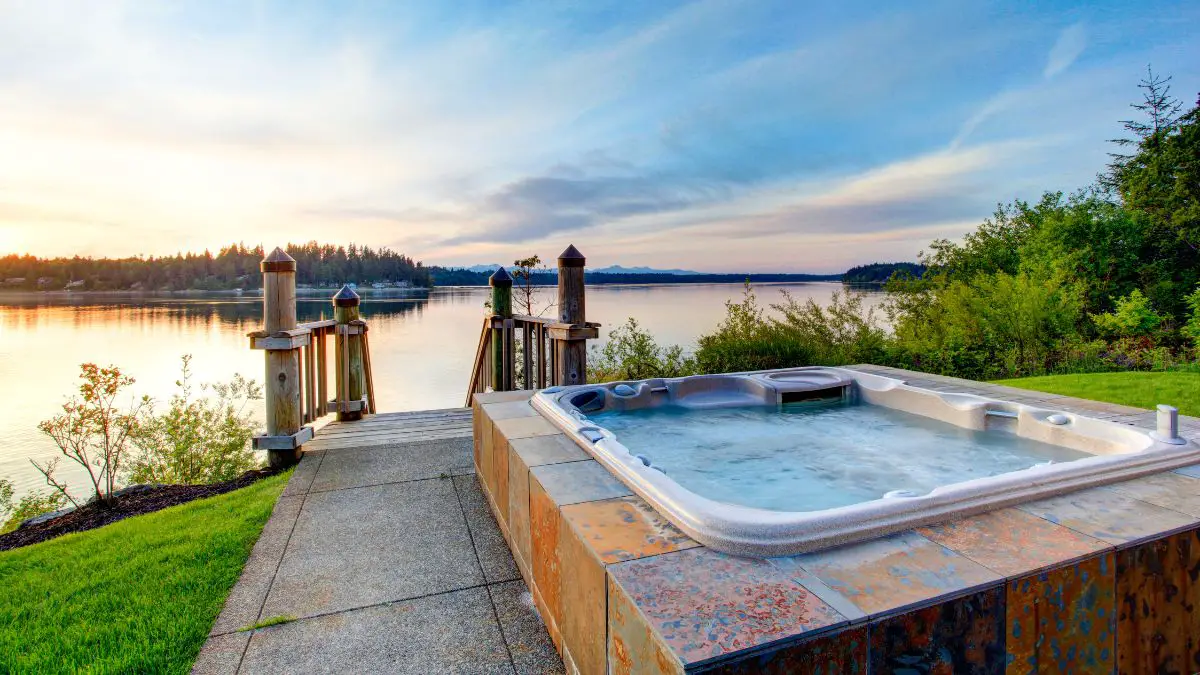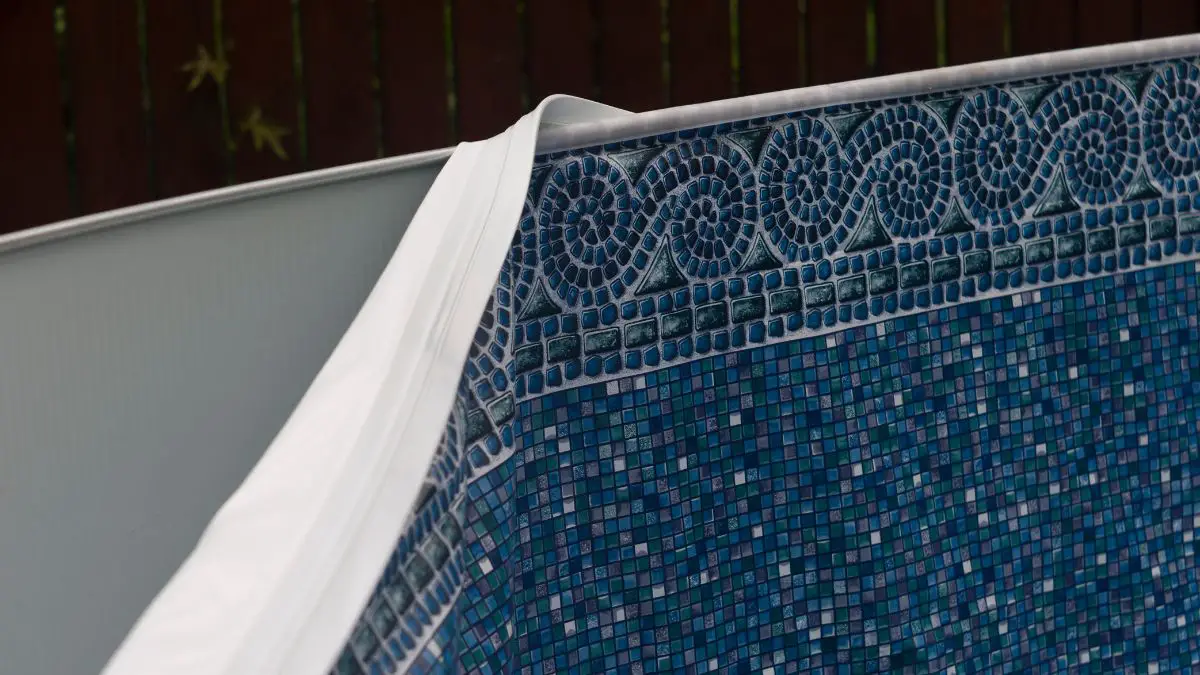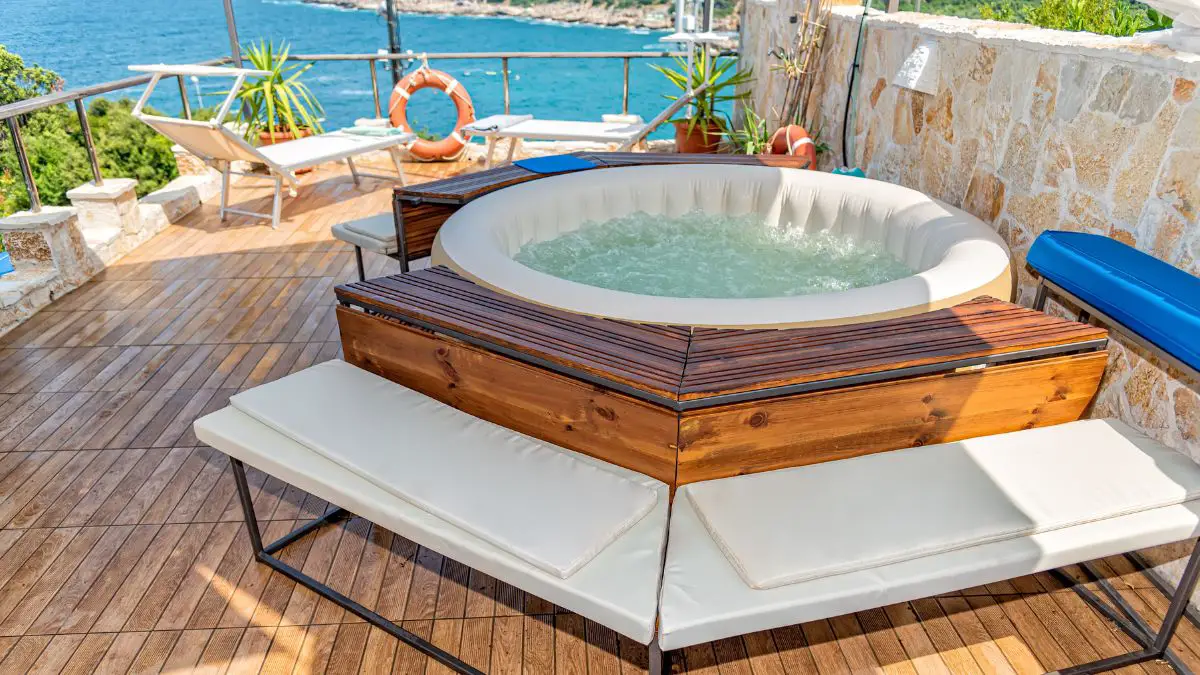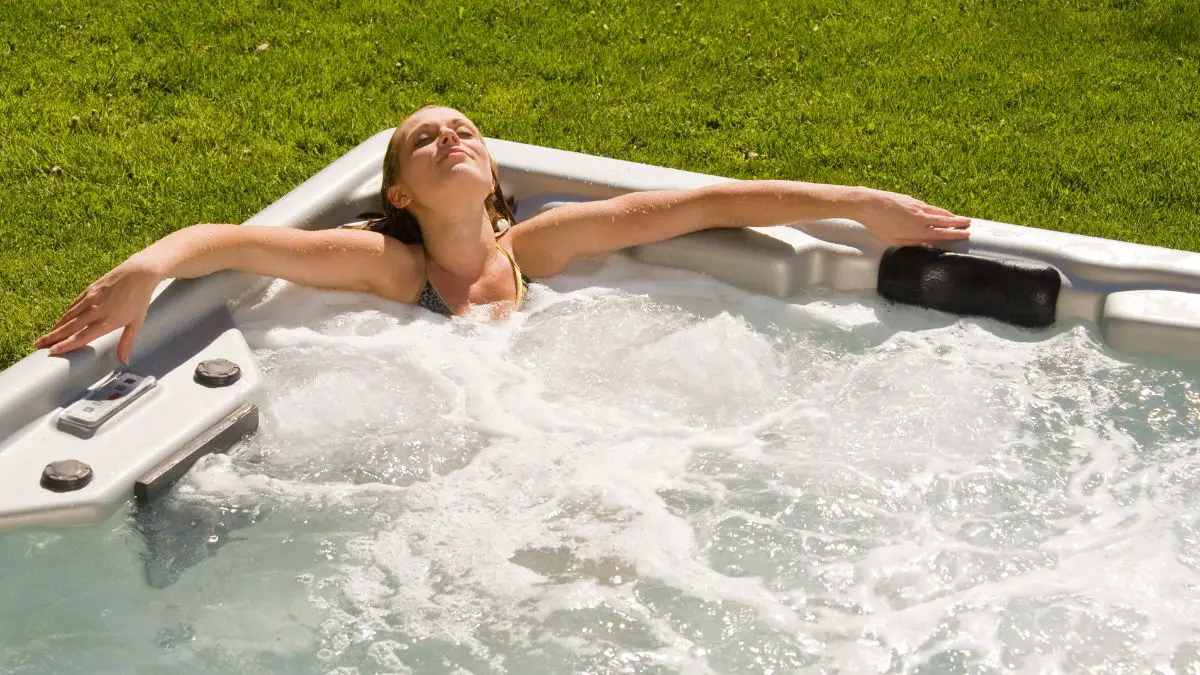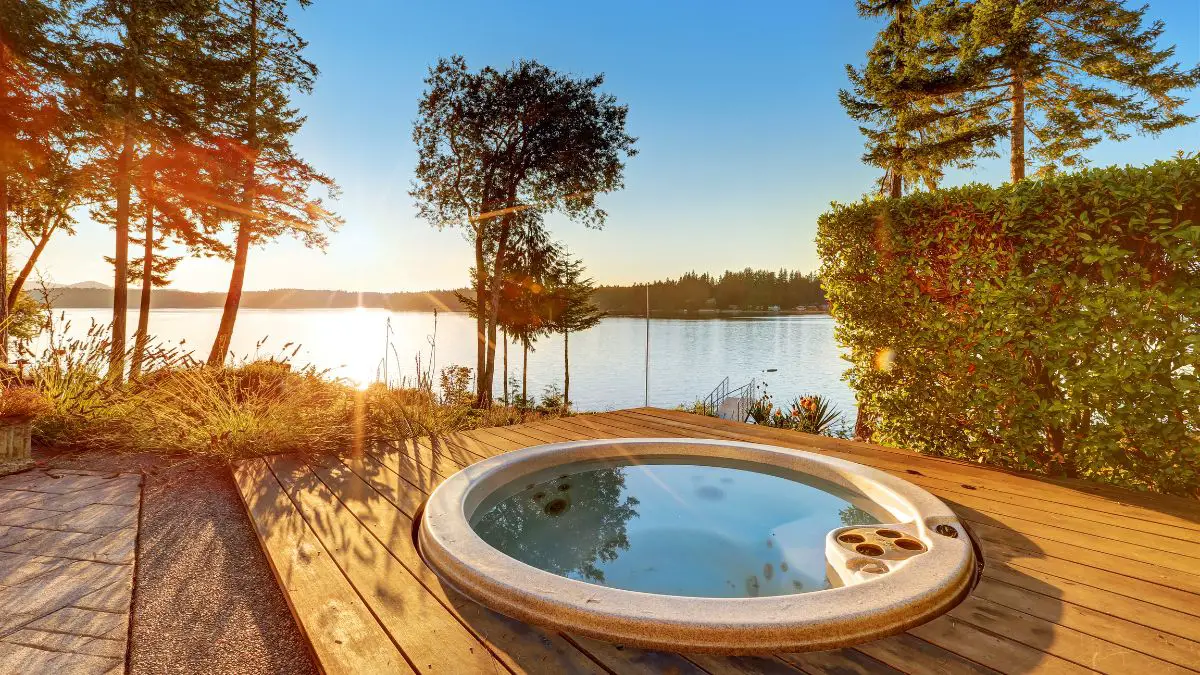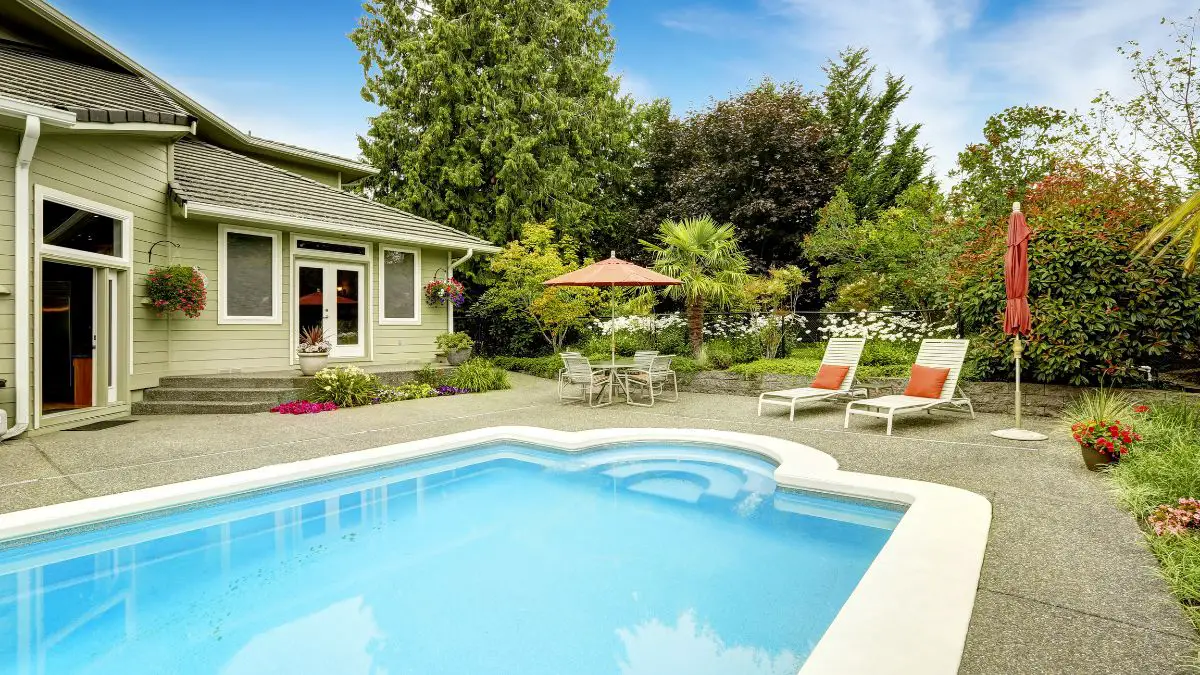You’ve probably asked yourself, “how to keep a pool clean without chlorine?” Well, you’re in the right place. This guide is designed to answer these questions and more.
Chlorine, while effective at killing bacteria and algae, has its downsides. The smell can be off-putting, it can cause skin and eye irritation, and it’s not exactly eco-friendly. Plus, there’s the constant need to balance your pool’s chemistry to prevent the water from becoming either too alkaline or too acidic.
Exploring chlorine alternatives for pools leads to healthier swimming. Whether it’s saltwater, UV, ozone, or mineral systems, each choice offers unique benefits. Your decision, based on your needs and budget, paves the way to a cleaner, safer pool.
But imagine a world where you can enjoy your pool without these concerns. A world where you can swim in clear, clean water without the harsh smell of chlorine. A world where you don’t have to worry about skin irritation after a long swim. This is the world of chlorine alternatives.
In this guide about alternative to chlorine for pools, you’ll discover on how to clean a pool without chlorine. You’ll learn about innovative systems that are not only effective at keeping your pool clean but are also healthier and more environmentally friendly.
| Key Takeaways |
|---|
| Saltwater systems, UV systems, ozone systems, and mineral systems are all viable alternatives to traditional chlorine pools. |
| Saltwater systems are gentler on the skin and eyes and require less day-to-day maintenance, but they can be more expensive to install and may cause corrosion. |
| UV systems are highly effective at killing a wide range of microorganisms and can significantly reduce the amount of chemicals needed, but they don’t prevent algae growth on pool surfaces. |
| Ozone systems are powerful sanitizers and can also reduce chemical use, but they don’t provide ongoing sanitization and can be more expensive to install and maintain. |
| Mineral systems are often gentler on the skin and eyes and can reduce chlorine use, but they may not be as effective against all types of algae and bacteria and can cause staining. |
| Lowering the pool’s water temperature can slow bacterial and algal growth and reduce the amount of chlorine needed, but it can make the water uncomfortably cold for some swimmers. |
| PHMB is a stable and effective alternative to chlorine that doesn’t irritate the eyes or skin or corrode pool surfaces, but it is more expensive and may require additional maintenance. |
| UV light can be used in combination with a small amount of chlorine to sanitize the pool and reduce chloramines, but it doesn’t provide residual sanitation. |
| Ultrafiltration uses a fine sieve to remove tiny microbes and other particles after basic filtering, reducing the need for chemicals, but it can be expensive. |
| Copper ionization is an effective, cost-effective, and pH-neutral alternative to chlorine that doesn’t irritate the eyes or skin, but it requires an electronic control unit and regular maintenance. |
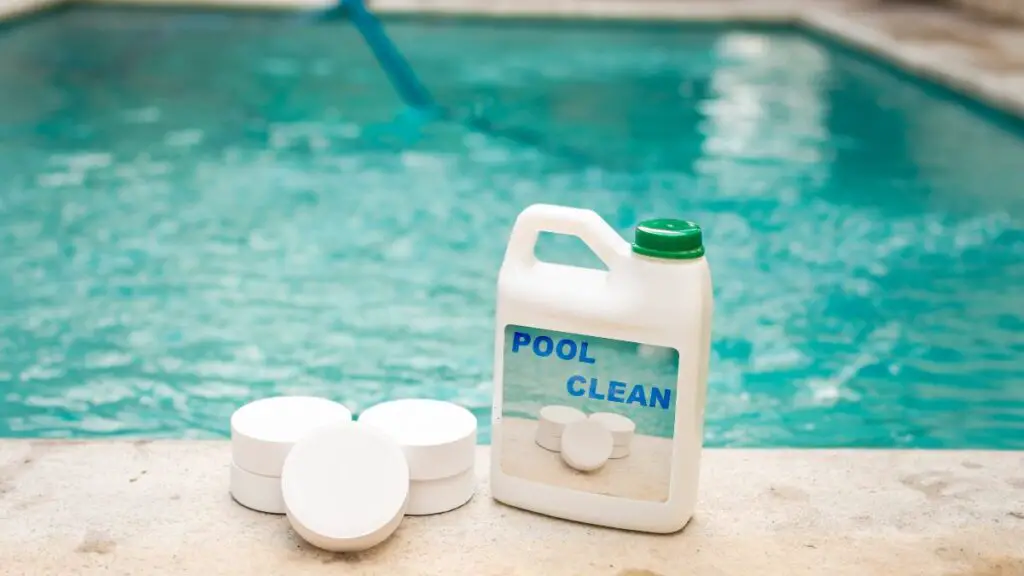
Why Seek Alternatives to Chlorine?
You might be wondering, “Why should I look for alternatives to chlorine?” After all, chlorine has been the go-to pool sanitizer for decades. But as you dive deeper into the world of pool maintenance, you’ll find that there are compelling reasons to consider chlorine alternatives.
Health Risks of Chlorine
Firstly, let’s talk about your health. Chlorine, while effective at killing bacteria and algae, isn’t always kind to the human body. You’ve probably experienced the dry skin and itchy eyes that can come after a long swim in a chlorinated pool. These are not just minor inconveniences. Regular exposure to chlorine can lead to more serious health issues like asthma and other respiratory problems.
Environmental Impact of Chlorine
Next, consider the environment. Chlorine doesn’t just disappear after it’s done sanitizing your pool. It can off-gas into the atmosphere, contributing to air pollution. When you drain your pool, the chlorinated water can harm plants and wildlife. In short, while chlorine is keeping your pool clean, it’s not doing any favors for Mother Nature.
Common Complaints About Chlorine
Finally, let’s address the common complaints from pool owners about chlorine. The smell, for one, can be quite off-putting. That strong, chemical odor is a telltale sign of a chlorinated pool. Then there’s the constant balancing act. Keeping your pool’s chlorine levels in check can feel like a full-time job. Too little, and you risk algae and bacteria growth. Too much, and you’re back to the health risks mentioned earlier.
So, you’re now aware of the potential downsides of chlorine. But don’t worry, this isn’t the end of your dream of a perfect pool. In fact, it’s just the beginning. As you continue to explore how to clean a pool without chlorine, you’ll discover a world of effective, eco-friendly alternatives that can make your pool a healthier and more enjoyable place to swim.
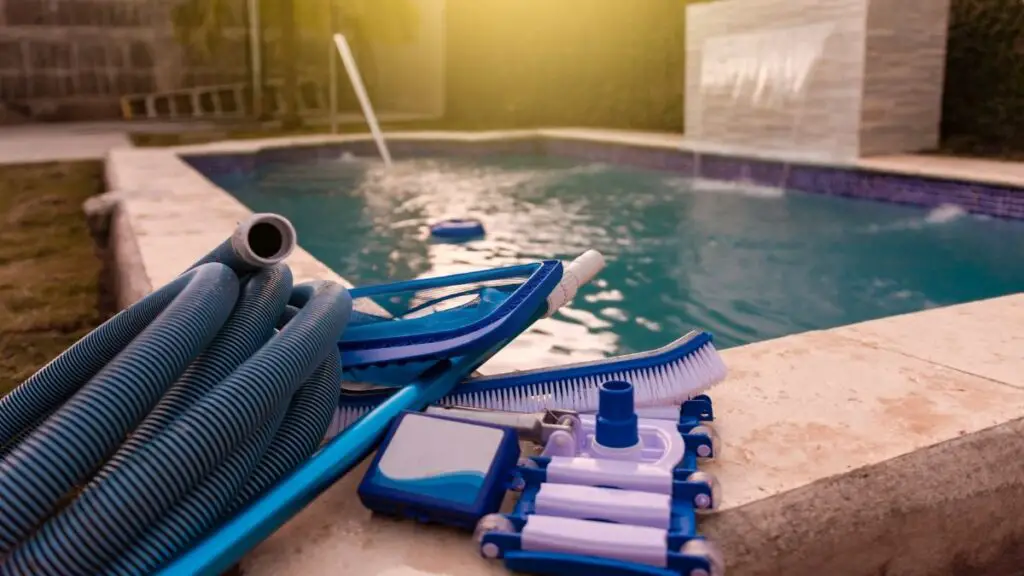
Exploring the Types of Chlorine Alternatives for Pools
As you embark on your journey to find the best way to keep your pool clean without chlorine, you’ll encounter several alternatives. Each of these systems offers unique benefits and potential drawbacks. Let’s dive in and explore these options.
Salt Water Systems
The saltwater system is one of the most popular alternatives to traditional chlorine pools. But how does it work?
A saltwater system uses a process called electrolysis to sanitize your pool. You add salt to your pool water, and the saltwater system’s generator breaks it down into hypochlorous acid and sodium hypochlorite, which are sanitizing agents used to clean the water.
Pros
- Saltwater pools are known for their softer, silkier water, which is gentler on the skin and eyes than chlorinated water.
- Once the system is set up and the salt level is balanced, saltwater pools require less day-to-day maintenance than traditional chlorine pools.
Cons
- Saltwater systems can be more expensive to install than traditional chlorine systems.
- The salt in the water can cause corrosion of certain types of pool equipment and certain types of pool finishes.
UV Systems
UV pool systems use ultraviolet light to kill bacteria, viruses, and other microorganisms in your pool water. The water circulates through a chamber where it is exposed to UV light, which disrupts the DNA of the microorganisms, rendering them harmless.
Pros
- UV systems can kill a wide range of microorganisms, including those that are resistant to chlorine.
- While UV systems are often used in conjunction with a small amount of chlorine, they can significantly reduce the amount of chemicals needed to keep your pool clean.
Cons
- UV systems kill microorganisms in the water that passes through the UV chamber, but they don’t prevent algae from growing on the pool walls or floor.
- UV systems can be expensive to install and the UV bulbs need to be replaced regularly.
Ozone Systems
Ozone systems use ozone gas, a powerful oxidizer, to kill bacteria and other microorganisms in your pool water. The system uses an ozone generator to create ozone gas, which is then injected into the pool water, where it kills microorganisms and breaks down contaminants.
Pros
- Ozone is a very powerful oxidizer, making it highly effective at killing bacteria and other microorganisms.
- Like UV systems, ozone systems can significantly reduce the amount of chemicals needed to keep your pool clean.
Cons
- Ozone gas quickly reverts back to oxygen, so it doesn’t provide ongoing sanitization after it’s injected into the water.
- Ozone systems can be more expensive to install and maintain than traditional chlorine systems.
Mineral Systems
Mineral pool systems use minerals like silver and copper to sanitize your pool. The minerals are slowly released into the water, where they kill bacteria and other microorganisms.
Pros
- Like saltwater pools, mineral pools are often reported to be gentler on the skin and eyes than chlorinated pools.
- Mineral systems can reduce the amount of chlorine needed to keep your pool clean.
Cons
- While mineral systems can kill many types of bacteria, they may not be as effective against all types of algae and bacteria. You may still need to use a small amount of chlorine or another type of sanitizer.
- The metals used in mineral systems can cause staining on the pool surfaces if the levels are not properly managed.
As you can see, there’s no one-size-fits-all solution for chlorine alternatives for pools. Each system has its unique benefits and potential drawbacks. Your choice will depend on your specific needs, budget, and personal preferences.
Whether you opt for a saltwater system, a UV system, an ozone system, or a mineral system, you’re taking a step towards a healthier and more enjoyable swimming experience.
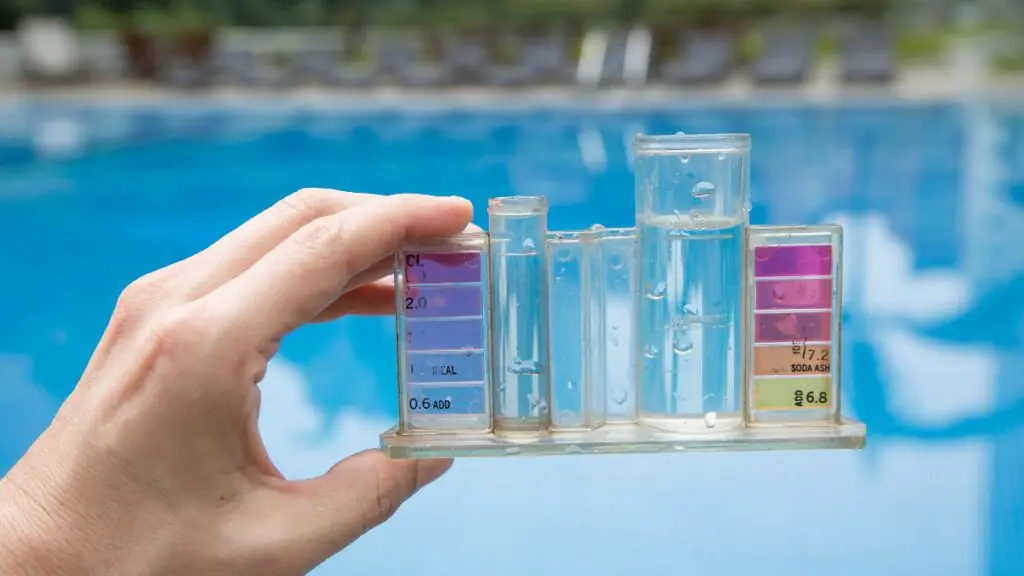
Comparing the Alternatives: A Closer Look at Chlorine-Free Pools
Now that you’re familiar with the various alternatives to chlorine for pools, let’s delve deeper into the comparison. You’re probably wondering about the cost, efficiency, and maintenance requirements of each system. Here’s a breakdown to help you make an informed decision.
Cost Comparison
When it comes to cost, there’s a range to consider:
- Salt Water Systems: These systems can be more expensive upfront due to the cost of the saltwater generator. However, the ongoing costs can be lower as salt is less expensive than chlorine.
- UV Systems: UV systems also have a higher initial cost, primarily due to the cost of the UV light unit. The ongoing costs include electricity and replacing the UV bulb every 1-3 years.
- Ozone Systems: Ozone systems can be pricey to install, and there are ongoing costs for electricity and occasional parts replacement.
- Mineral Systems: These systems are generally less expensive to install than the other alternatives, but you’ll have ongoing costs for replacing the mineral cartridges.
Efficiency Comparison
In terms of efficiency, each system has its strengths:
- Salt Water Systems: These systems are highly efficient at maintaining a steady level of sanitation in your pool, as they continuously generate chlorine from the salt in the water.
- UV Systems: UV systems are extremely efficient at killing microorganisms as the water passes through the UV chamber, but they don’t provide residual sanitation in the pool.
- Ozone Systems: Ozone is a powerful oxidizer and very efficient at killing microorganisms. However, like UV systems, it doesn’t provide residual sanitation.
- Mineral Systems: Mineral systems are efficient at killing certain types of bacteria, but they may not be as effective against all types of algae and bacteria.
Maintenance Comparison
When it comes to maintenance:
- Salt Water Systems: Once the system is set up and the salt level is balanced, saltwater pools require less day-to-day maintenance than traditional chlorine pools.
- UV Systems: These systems require very little maintenance, other than replacing the UV bulb every 1-3 years and keeping the UV chamber clean.
- Ozone Systems: Ozone systems require regular maintenance to check the ozone generator and replace parts as needed.
- Mineral Systems: These systems require minimal maintenance, other than replacing the mineral cartridges every 6 months to a year.
As you can see, each system has its pros and cons in terms of cost, efficiency, and maintenance. Your choice will depend on your specific needs, budget, and how much time you’re willing to devote to pool maintenance. But no matter which system you choose, you’re on your way to a healthier, more enjoyable swimming experience.
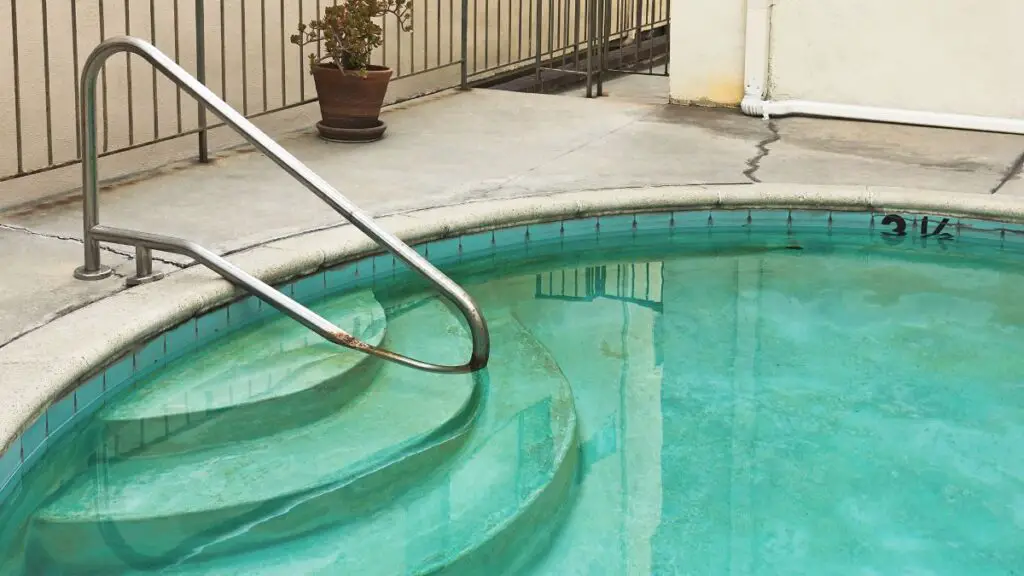
Other Alternatives to Chlorine You Can Also Consider
Lowering Water Temperature:
By decreasing your pool’s water temperature below its usual level, you can inhibit bacteria and algae growth. These microorganisms typically flourish in warm to hot conditions. Cooler temperatures also slow chemical reactions, including those involving human skin.
While this isn’t a standalone solution, it can certainly lessen the amount of chlorine needed. However, swimming in colder water might be uncomfortable for some. The method you choose to cool your water largely depends on the weather.
For warm climates, a pool chiller might be suitable. In colder weather, aeration or oxygenation via fountains could work. If you have a water heater, lower the thermostat. Keep in mind, heaters and chillers can be costly compared to other pool equipment. Despite the reduced chlorine usage, the expense might not be justifiable.
PHMB:
Certain brands, like Baquacil and Softswim, have introduced Polyhexamethylenebiguanide (PHMB) as an effective alternative to chlorine. PHMB is more stable than chlorine and isn’t affected by sunlight, eliminating the need for a stabilizer.
It’s also gentler on the eyes and skin and doesn’t corrode pool surfaces. However, PHMB is pricier than chlorine, and maintaining a PHMB pool can be costly. You might also need hydrogen peroxide as an oxidizer and monthly pool filter cleanings.
If you’re switching to PHMB, it’s advisable to drain any water containing traces of chlorine. Also, ensure that your skin or swimsuit is free of chlorine before swimming to avoid reactions with PHMB.
Bromine:
Bromine is an alternative to chlorine (often used in hot tubs), although it shares similar properties due to being a halogenic compound. Despite fulfilling the same roles as chlorine, bromine is not a widely preferred option due to its higher cost.
Like chlorine, bromine must be used alongside other chemicals and additives. Stabilizing bromine can be challenging and doesn’t perform well in outdoor pools. Therefore, while bromine is an alternative, it may not be the most practical or cost-effective choice for all pool owners.
Ultrafiltration:
Ultrafiltration involves using a fine sieve to remove tiny microbes, skin particles, hair, and more after basic filtering. Apart from the minimal amount of chlorine needed, this filter removes all other suspended particles, organic matter, and bacteria.
The system includes filter tubes with thin membranes circulating water at low pressure. These membranes have semi-permeable pores that allow essential disinfectants and certain salts to permeate back into the pool, purifying the water without chemicals.
However, this technology is currently too expensive for most applications. Over time, advancements and increased production should reduce the cost of these systems.
Pristine Blue:
Pristine Blue is a unique technology created by Earth Science Laboratories. The primary ingredient is copper sulfate pentahydrate, making up to 19.8% of its active components.
This technology leverages the power of positively charged copper ions to annihilate negatively charged bacteria and other pool contaminants. While highly effective, it’s important to note that Pristine Blue is among the more expensive options for maintaining a swimming pool.
Copper Ionization:
Regarded as one of the best alternatives to date, copper ionization offers an effective solution for a chlorine-free pool. This method doesn’t leave residual chemicals that can irritate the eyes and skin. It’s a cost-effective choice that results in healthy pool water.
A copper ionization system includes an electronic control unit, test kits, and a copper electrode. The ionization process releases metallic ions into the water using a low voltage current. These positively-charged copper ions are attracted to negatively-charged bacteria and algae, penetrating their cell membranes.
As the water recirculates, more ions are produced. Copper ions are unaffected by sunlight, eliminating the need for a stabilizer. Unlike chlorine and salt systems, ionizers are pH neutral, simplifying pH maintenance. These systems are easy to install, maintain, and can be retrofitted to your existing chlorinated pool.
Frequently Asked Questions About Alternative to Chlorine for Pools
Are chlorine alternatives as effective as chlorine?
Yes, chlorine alternatives like saltwater, UV, ozone, and mineral systems can be just as effective as chlorine at sanitizing your pool. Each system has its unique method of killing bacteria and other microorganisms, and some systems may be more effective against certain types of contaminants than others.
Can I switch from a chlorine system to a chlorine alternative?
Absolutely! Switching to a chlorine alternative can be a great choice if you’re tired of dealing with the smell, skin irritation, and other downsides of chlorine. The process will involve initial setup and possibly equipment installation, but many pool owners find the benefits well worth it.
Do chlorine alternatives require more maintenance than chlorine?
Not necessarily. While some systems, like ozone, may require regular maintenance checks, others, like saltwater and UV systems, can actually reduce your day-to-day pool maintenance tasks.
Are chlorine alternatives more expensive than chlorine?
The initial cost to set up a chlorine alternative system can be higher than a traditional one. However, the ongoing costs can be lower, especially for systems like saltwater that use less expensive consumables.
Remember, the best system for you will depend on your specific needs, budget, and preferences. By exploring these chlorine alternatives, you’re taking a step towards a healthier, more enjoyable swimming experience.
Conclusion: Embrace the Future of Pool Sanitization
You’ve embarked on a journey through the world of chlorine alternatives for pools, exploring the pros and cons of each system, comparing costs, efficiency, and maintenance requirements, and answering some of the most common questions about these innovative pool sanitization methods.
You’ve discovered that the traditional method of using chlorine is not the only way to keep your pool clean and safe. Alternatives like saltwater, UV, ozone, and mineral systems offer unique benefits and can be a great fit depending on your specific needs and preferences.
As you move forward, keep in mind that switching to a chlorine alternative is not just about maintaining a clean pool. It’s about improving your swimming experience. It’s about reducing the potential health risks associated with chlorine and minimizing your pool’s environmental impact.
In the end, the choice is yours. Whether you opt for a saltwater system, a UV system, an ozone system, or a mineral system, you’re taking a step towards a healthier, more enjoyable swimming experience.


